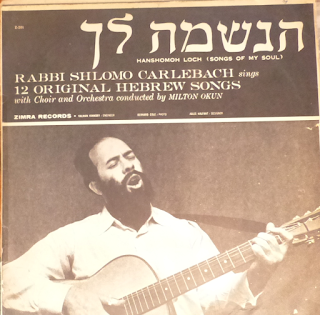 |
| Shlomo Carlebach’s first album - circa 1959 (popsike) |
Needless to say, it doesn’t matter what their station in life is. Whether they are great rabbis with many adherents, or philanthropists that have funded many religious institutions without which they would cease to exist. Nor does it matter how influential they are or how great their non financial contributions might be. People who use other human beings for their own sexual gratification do not deserve to see the light of day, much less idolized for any contributions they make. No matter how great those contributions might otherwise be.
But what if…
What if those non financial contributions are so outsized… so gigantic, so widely popular among all strata of Jewry worldwide - that it is impossible to eradicate? Such is the case with the late Shlomo Carlebach, who died almost 30 years ago at age 69.
To be honest, I am not such a fan of Jewish music. I find the melodies to be repetitive.
Not that I hate them. But with few exceptions, after awhile they all begin to sound alike and a bit boring. But in the case of Carlebach whose melodies were structured pretty much in the East European style of folk music, I have to admit I do enjoy it a bit more than most of the rest of what passes for Jewish music.
What is unique about Carlebach is that his pioneering contribution to Jewish music is unparalleled and likely to remain so for eternity. No other composer of Jewish music – past or present comes anywhere close. I think there is just about universal agreement about that even among today’s top composers and performers of Jewish music.
Carlebach’s hundreds of compositions are so prolific, so popular, so widespread that they are employed by Sheluchei Tzibur (cantors) all over the world. His songs can be heard even in Conservative synagogues and Reform Temples.
Making things complex is that fact that a lot of people don’t know about the accusations of abuse against Carlebach. Especially people in the more closed environments of the Charedi and Chasidic world. Making things even worse (by far) is that fact that a lot of Sheluchei Tzibur who incorporate his melodies into their repertoire aren’t even aware that they are Carlebach compostions. His tunes have been used in this way for decades by a great many people.
Considering all of these facts, I think it is impossible to erase his name much less his music. To this day he is lionized by the Jewish music industry – recognized for the pioneer he was. It is quite possible that without Carlebach there would be no such thing as Jewish music as we know it today (If you think Jewish music is terrible now, you should listen to the stuff that was coming out before Carelbach. It was pretty pathetic!)
This brings me to a story reported in Arutz Sheva. His alleged victims have finally gotten around to suing Carlebach’s estate for partial compensation. I agree with Rabbi Yosef Blau, the Mashgiach Ruchani of Yeshivas Rabbeinu Yitzchak Elchanan (YU), who said the following:
We should stand with the alleged victims of sexual abuse and harassment even though the alleged abuse happened 30 plus years ago and he has since died - the same as if the alleged abuse was perpetrated yesterday.
They surely deserve to be compensated for all the mental anguish he caused them – which they probably continue to suffer to this day. I can’t imagine what it must be like for a survivor of his abuse to hear his tunes being utilized by a Shaliach Tzibur in a Shul. Or by the band at a wedding or Bar Mitzvah. If you are an Orthodox Jew it is almost impossible to avoid his music these days.
It must also be more than frustrating to hear the praise heaped upon him to this day by people in the Jewish music industry, or the icon status he is given by fans that do not believe the accusations.
On the other hand, some Carlebach devotees take serious umbrage at those accusations - denying it was even possible for their icon to have done the things he is being accused of.
The point of all this is that I don’t think there is anything we can do about it. The Gemara tells us: Shem Reshaim Yirkav - May the memory of the wicked rot! (Yoma 38b). But Carlebach’s influence remains pervasive and near impossible to avoid. His music is beloved by a huge swath of Jewry in all denominations all over the world. And will forever be associated with his name.
I do know a few people that try and boycott venues that use his music. Or walk out if they unexpectedly hear it . But they are very small in number and do not make any dent at all in the way his music is so widely accepted.
I’m sure that survivor advocates would like to see that change. It probably should. But it ain’t gonna happen.
At least, though, the next time someone enjoys his tunes wherever they might hear them – whether in a Shul, a wedding, a Bar Mitzvah, or a concert, they should at least feel a little bit of guilt about it. I sure do.